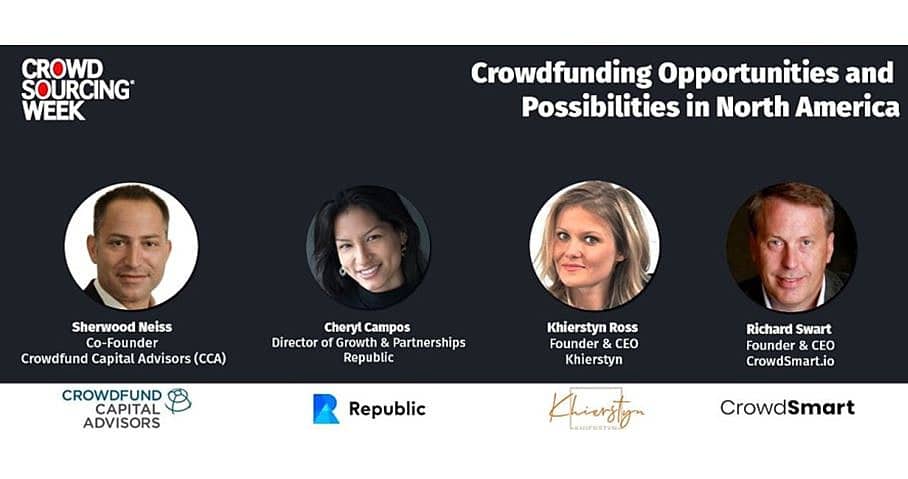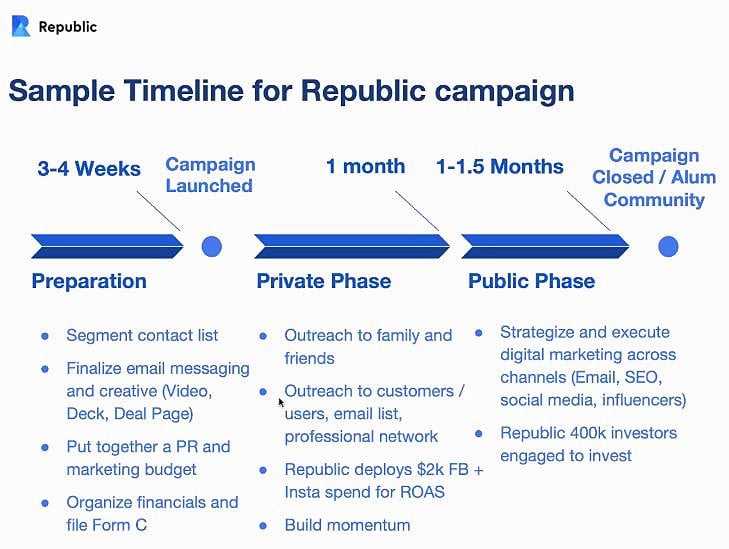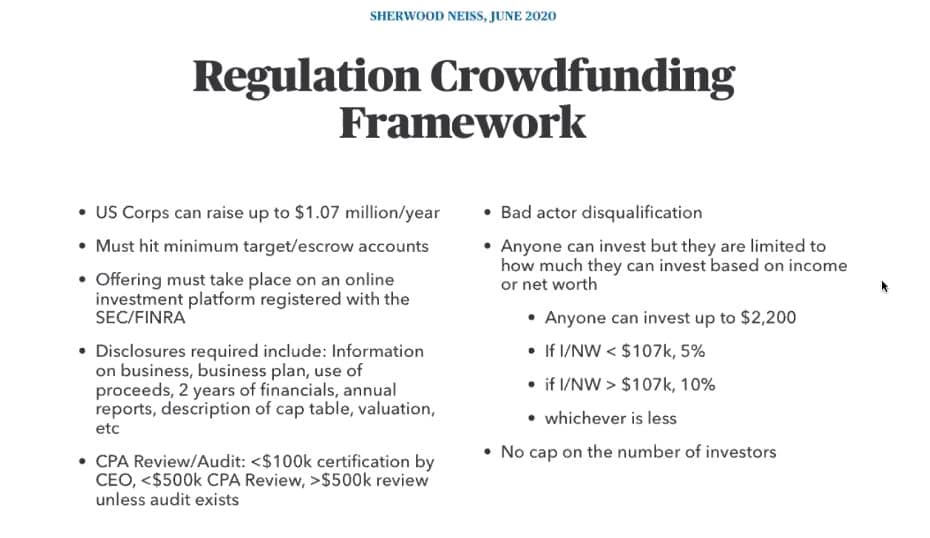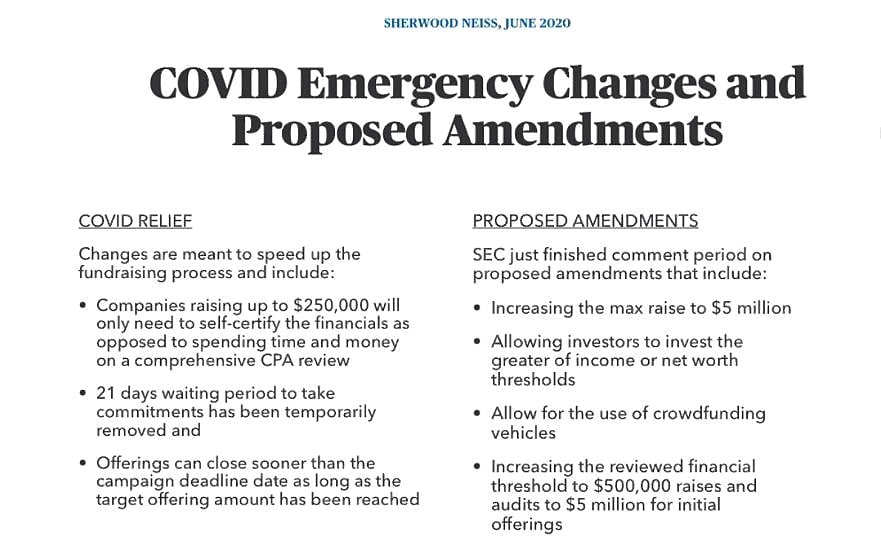Our one-day Virtual Crowd Summit on June 11 covering Crowdfunding was very well received by attendees. It was structured in three parts: Parts 1 and 2 focused on Europe; Part 3 then featured speakers covering rewards and equity crowdfunding in North America, recent changes to the SEC Reg CF regulations, and corporate use of crowdfunding. Here’s a recap of Part 3.
Rewards Crowdfunding in North America
Khierstyn Ross, the “Crowdfunding Queen” based in Toronto, Canada, guides owners of businesses making physical products to achieve six-figure sales through reward crowdfunding platforms. Who better to speak on “Launching A Successful Crowdfunding Campaign”?
 The first priority is to select the right items to offer as a crowdfunding reward. Ideally, items will be new products, or at least an upgrade to something that already exists. Otherwise, what’s the point? If your product, or something very similar, is already in the shops then people will just go out – or go online – and buy it. So some form of a USP (unique selling point) is always a good sign.
The first priority is to select the right items to offer as a crowdfunding reward. Ideally, items will be new products, or at least an upgrade to something that already exists. Otherwise, what’s the point? If your product, or something very similar, is already in the shops then people will just go out – or go online – and buy it. So some form of a USP (unique selling point) is always a good sign.
Secondly, as well as being salient, successful rewards are also relevant. They have to serve a need, ease a recognized pinch-point.
Third, reward items must be at least at a prototype stage, with images available. Five years ago this was not the case, though this factor has been introduced to prevent fraudulent projects raising money to invest in taking ideas through stages of “product development.”
Another key point Khierstyn shared is the multiple roles that rewards crowdfunding can fulfil. A successful round of rewards crowdfunding can validate a new product; educate the makers through prompting market feedback; take a product cross-border to a global audience; and it’s good marketing. A successful crowdfunding project in Norrth America will feature well in search results for months after it closes, leading people to the product owner’s own website.
Equity Crowdfunding in North America
Cheryl Campos, Director of Growth and Partnerships at the equity crowdfunding platform Republic, agreed that good crowdfunding in North Americ is good marketing. Although it isn’t a compulsory requirement, equity crowdfunding projects can also provide investors with perks. Some offer discounted online purchases, branded merchandise, or invitations to restricted events.
Republic uses four important criteria to evaluate startups on behalf of their community of half a million investors: “The 4 Ts.”
Team
A startup funder has to have prior career and industry experience that adds up to a set of skills and expertise that can give investors confidence. But few investors will back a one-man (or woman)-band, and want to see a credible management team already in place, a team that has bought in to the founder’s vision of the startup business and have the ability to make a solid contribution.
Traction
Evidence of traction includes a passionate and engaged user base. Perhaps this has been achieved by an earlier round of rewards crowdfunding in North America?
Technology
Is the startup’s product range superior to competitors? Or maybe their technology to make their products is superior, delivering a cost advantage. Are they following the sector’s traditional business model, or have they developed breakthrough innovations to shake up the established incumbents?
Terms
The terms a startup offers investors can vary, based on different methods of estimating a company valuation and with different classes of preference or voting shares, for example. It could make it harder to reach a financial target if crowdfunding backers receive poorer terms than other investors.
Here is a summary of the time scale Republic advises clients to work to.
US Crowdfunding Controls
US equity crowdfunding operates under legislation enforced by the SEC (Securities Exchange Commission). There are two classes of accredited and non-accredited investors, with the latter group subject to limitations on how much they are allowed to invest. Such rules were put in place to protect inexperienced investors.
Sherwood Neiss of Crowdfund Capital Advisers addressed the issue of “Regulation Crowdfunding Rules to Help Restore America’s Small Businesses.” He explained that some of the rules applied to Regulation Crowdfunding (Reg CF) have been temporarily eased due to the pandemic lockdown that has seen the US unemployment rate soar. The relaxations make it is easier and less expensive for small businesses to raise money, and receive it faster, as part of their efforts to remain solvent and retain employees.
An assessment of the equity crowdfunding market prior to the relaxations found several positives. The number of non-accredited investors that support equity crowdfunding projects grew from 61,000 in Year One to 265,000 in Year Four. Businesses that used equity crowdfunding successfully averaged 23% growth in the subsequent 12 months.
The SEC also reported no cases of fraud. Any individual investor could fall prey to a scam, though through investing as a crowd there are hundreds, maybe thousands of people with different knowledge, experience and skills who can share their thoughts. A crowd’s greater power to potentially detect a scam has been adequate deterrence to prevent anyone trying.
The SEC’s rule relaxations have made is quicker and reduced the cost of running Reg CF rounds of fundraising, contributing to a ground-up funding of community businesses supported by community members. Although they are due to expire in February 2021, plenty of voices in the sector are already calling for the relaxations to be kept in place within a more liberal set of permanent controls.
Corporate Uses of Crowdfunding
CrowdSmart is an investment platform that uses AI and Collective Intelligence to improve the accuracy of predicting investment success. Richard Swart, their Strategic Adviser to the Board, finished the day’s virtual summit with a look at reasons why the corporations use crowdfunding in North America.
NPD
A major priority for corporates is to maximize the efficiency of their new product development programs. They are increasingly turning to AI techniques and open innovation to reduce the number of failures, or at least to find ways for them to fail faster and less expensively.
Offering a product via a reward crowdfunding project can provide customer validation, and generate feedback from early trialists. It can be better to do this anonymously, hiding the identity of the corporation as it could skew results by giving backers a greater feeling of trust in the product, regardless of its actual inherent merits.
As a specific example, Kimberley Clark micro-funds project innovation ideas from women, and teams them up with internal entrepreneurs to develop products for the marketplace, with rewards crowdfunding able to provide proof of concept.
CSR
Crowdfunding is also a vehicle through which corporates can demonstrate a social responsibility. For example, staff can be encouraged to find projects they can lend support to by donating their skills and resources. This has been found to improve staff retention.
Other corporates issue staff with an allowance to support crowdfunding projects that are both related to their business sector and provide social benefits. This not only helps the projects, it has also been found to improve staff morale and, again, staff retention.
Marketing
An internal benefit. Feedback from crowdfunding backers can provide a lot of insight, not only in to customer product requirements but also in to a whole thought process and purchase cycle they use to select purchases and evaluate their performance. It has been seen to be far more powerful to educate and inspire internal staff than de-briefs of research company focus groups.
An external benefit. In 2015, Chrysler supported its Dodge Dart vehicle with a tv commercial that put forward crowdfunding as a way for people to make one more affordable. People could sponsor different parts of the car as a gift. Aspiring Dart owners were encouraged to use their social media accounts to spread the word, which added 70 million audience impressions to the advertising campaign’s achievement.
Don’t miss our Crowdfunding Day on December 9, 2021








0 Comments